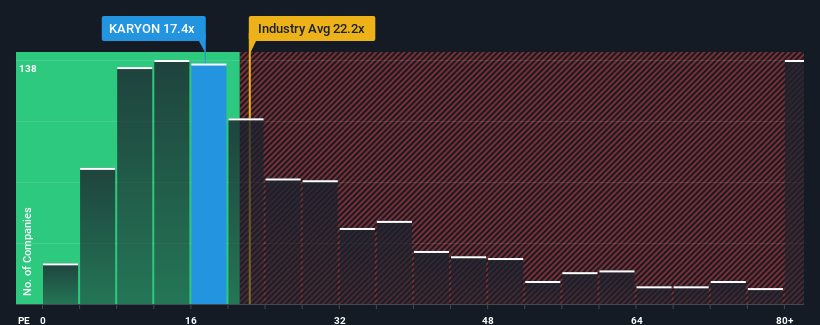Karyon Industries Berhad's (KLSE:KARYON) 34% Share Price Surge Not Quite Adding Up
Karyon Industries Berhad (KLSE:KARYON) shareholders have had their patience rewarded with a 34% share price jump in the last month. The last 30 days bring the annual gain to a very sharp 42%.
Although its price has surged higher, it's still not a stretch to say that Karyon Industries Berhad's price-to-earnings (or "P/E") ratio of 17.4x right now seems quite "middle-of-the-road" compared to the market in Malaysia, where the median P/E ratio is around 18x. Although, it's not wise to simply ignore the P/E without explanation as investors may be disregarding a distinct opportunity or a costly mistake.
The recent earnings growth at Karyon Industries Berhad would have to be considered satisfactory if not spectacular. It might be that many expect the respectable earnings performance to only match most other companies over the coming period, which has kept the P/E from rising. If you like the company, you'd be hoping this isn't the case so that you could potentially pick up some stock while it's not quite in favour.
See our latest analysis for Karyon Industries Berhad

How Is Karyon Industries Berhad's Growth Trending?
Karyon Industries Berhad's P/E ratio would be typical for a company that's only expected to deliver moderate growth, and importantly, perform in line with the market.
Taking a look back first, we see that the company managed to grow earnings per share by a handy 6.7% last year. Pleasingly, EPS has also lifted 36% in aggregate from three years ago, partly thanks to the last 12 months of growth. Accordingly, shareholders would have probably welcomed those medium-term rates of earnings growth.
This is in contrast to the rest of the market, which is expected to grow by 18% over the next year, materially higher than the company's recent medium-term annualised growth rates.
In light of this, it's curious that Karyon Industries Berhad's P/E sits in line with the majority of other companies. It seems most investors are ignoring the fairly limited recent growth rates and are willing to pay up for exposure to the stock. They may be setting themselves up for future disappointment if the P/E falls to levels more in line with recent growth rates.
The Key Takeaway
Its shares have lifted substantially and now Karyon Industries Berhad's P/E is also back up to the market median. It's argued the price-to-earnings ratio is an inferior measure of value within certain industries, but it can be a powerful business sentiment indicator.
Our examination of Karyon Industries Berhad revealed its three-year earnings trends aren't impacting its P/E as much as we would have predicted, given they look worse than current market expectations. When we see weak earnings with slower than market growth, we suspect the share price is at risk of declining, sending the moderate P/E lower. Unless the recent medium-term conditions improve, it's challenging to accept these prices as being reasonable.
Plus, you should also learn about these 2 warning signs we've spotted with Karyon Industries Berhad (including 1 which doesn't sit too well with us).
You might be able to find a better investment than Karyon Industries Berhad. If you want a selection of possible candidates, check out this free list of interesting companies that trade on a low P/E (but have proven they can grow earnings).
Valuation is complex, but we're here to simplify it.
Discover if Karyon Industries Berhad might be undervalued or overvalued with our detailed analysis, featuring fair value estimates, potential risks, dividends, insider trades, and its financial condition.
Access Free AnalysisHave feedback on this article? Concerned about the content? Get in touch with us directly. Alternatively, email editorial-team (at) simplywallst.com.
This article by Simply Wall St is general in nature. We provide commentary based on historical data and analyst forecasts only using an unbiased methodology and our articles are not intended to be financial advice. It does not constitute a recommendation to buy or sell any stock, and does not take account of your objectives, or your financial situation. We aim to bring you long-term focused analysis driven by fundamental data. Note that our analysis may not factor in the latest price-sensitive company announcements or qualitative material. Simply Wall St has no position in any stocks mentioned.
Have feedback on this article? Concerned about the content? Get in touch with us directly. Alternatively, email editorial-team@simplywallst.com
About KLSE:KARYON
Karyon Industries Berhad
An investment holding company, manufactures and trades polymeric products in Malaysia, Asia, and internationally.
Flawless balance sheet with solid track record.
Market Insights
Community Narratives




